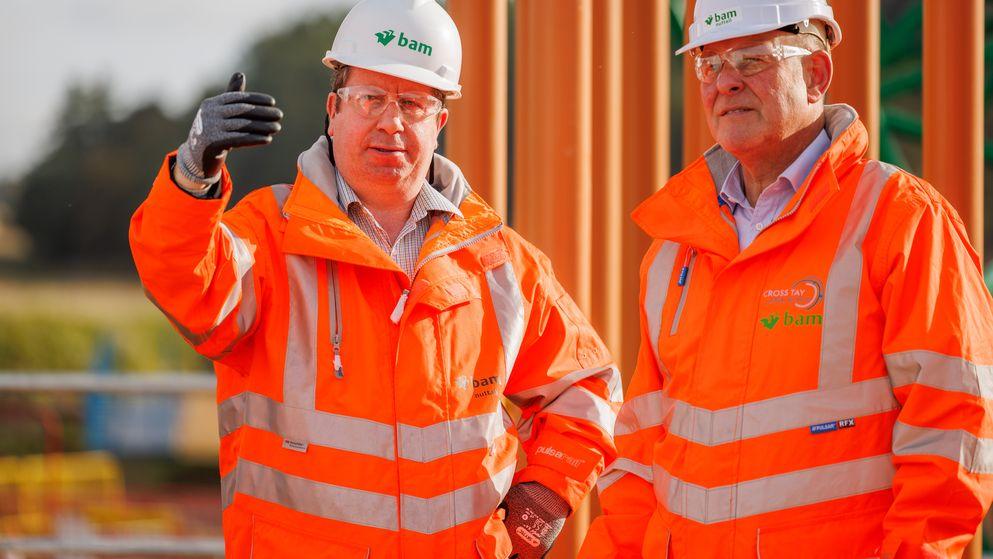
Collaborating for a brighter future
Collaborating for a brighter future
What's the secret to developing collaborative people? And how can they help the construction industry overcome its current challenges?
Last week BAM’s COO, John Wilkinson, spoke to the Institute of Collaborative Working at the House of Lords, on the importance of developing people with the skills and determination to build a sustainable tomorrow.
Within the construction industry, we have some major challenges ahead of us. Within a landscape of reduced treasury budgets for infrastructure investments, we have a key role to play in creating the sustainable built environments needed for the future. We must also continue to modernise our working practises, embrace new technology and innovations, and address a shortage of people and skills.
We are an industry that has always walked a tightrope, balancing hard-won, small margins, with the need for innovation, modernisation, and investment in skills for the future. Yet it has never been more important to save time and money in project delivery, to deliver greater social value and sustainability outcomes, and to help funding pots stretch further.
Working with clients who share our vision
We know that we are not alone in the difficulties that we face. When we sit around the table with our clients, we learn that the challenges we face are shared. To deliver the buildings and infrastructure that they need, our clients are not simply looking for a contractor who knows how to build, but for a true collaborative partner - a partner who knows them, who understands their challenges, and who shares their visions and aspirations.
It will only be by working together with our clients that we can face these challenges head-on. If a project is to be as efficient and successful as it can be, then all project partners need to work together to develop the best solutions. Collaboration means making the best of the unique combination of talents and knowledge that each of us brings, to create a stronger team, who together can deliver a better result.
What role will collaboration play in delivering the projects of the future?
Within our industry, a lot of time is spent talking about the importance of collaboration, but perhaps less time is spent considering exactly what it means, and how we can most effectively collaborate. For example, early engagement of contractors on projects is an excellent way of enabling collaboration and improving project delivery. It enables project partners to agree on collaborative ways of working and sharing information right from the start, so that they can deliver the best school, hospital, bridge, or railway possible.
With a demand to create better value for funders, stakeholders, and society, we are seeing more and more of our clients seeking this purposeful collaboration and engaging with contractors earlier. Taking guidance from UK Government Construction and Sourcing Playbooks, we are being appointed through new collaborative contracts within the industry, such as partnerships and alliances.

Collaborative people will be the key
The key to our success in these new partnerships will be our investment in collaborative people who are able to inspire, lead, and deliver the infrastructure projects of the future. What if the next generation of leaders were to do things differently?
The key to addressing the challenges we face in our industry will be the incredible, passionate, and talented people who work within our sector. Whilst working practices and processes can guide us towards better collaboration, our ability to truly collaborate relies on the people who are doing the collaborating. It is their skills, behaviour, and leadership capabilities that will determine our success.
Developing people with collaborative skills and leadership
Being able to support people’s development is one of the wonderful things about working in construction and engineering. Our industry offers fantastic opportunities and a huge range of diverse career paths.
Developing the skills and expertise to work collaboratively takes more than training and assessment. A truly collaborative culture needs nurturing and support. It needs investment in a broad spectrum of initiatives, such as personal development schemes, internal and cross-company mentoring and placement schemes, and inspirational team building and leadership management programmes.
We must also support the young and passionate people who are entering our industry at the start of their careers. They bring the energy and drive to do things differently – to build more sustainably, to improve equity in the industry, and to work in a more collaborative and balanced way. We must mentor and nurture these new voices and provide them with the opportunity to improve how infrastructure projects are planned, designed, and delivered.
At BAM collaboration is one of our five business values – we describe this as ‘together we thrive’. Collaborative behaviour starts at the beginning of each of our career journeys. It’s part of our apprentice and graduate programmes, it’s intrinsic in our recruitment assessment, and is a key focus of our leadership and management development.
And we must encourage more people to consider a career within our industry. We face a challenging skills gap, and we have work to do to shift perceptions of our industry. Young people need to see that construction is not just about building structures. It’s about making the future possible. It’s about working in teams to solve complex problems. It’s about using cutting-edge technology to create sustainable and resilient buildings, and it’s about collaborating effectively to make a tangible, positive impact on society.
Collaboration is not just a nice to have. It’s a must-have and ultimately, it’s the key to ensuring our industry’s long-term success and sustainability.
About the author

John Wilkinson
Chief Operating Officer of BAM UK & Ireland
John is Chief Operating Officer of BAM UK & Ireland.
John started his career in 1989 as a trainee engineer and progressed through senior engineer, site manager and project director roles, before gaining his first managing director role in 2008.
He held senior positions within leading construction and civil engineering companies Laing O’Rourke, Kier, May Gurney and SNC-Lavalin, before joining BAM in 2020.
Client focused and strategic, John has a clear focus on governance, team development, driving business reputation and revenue growth.

